Theatre Reviews
WHEN THE BAND BEGINS TO PLAY by Patricia Hartshorne - GlovesOff
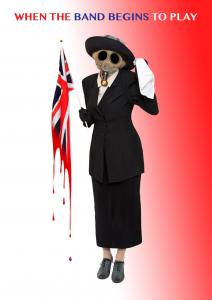
Arts Centre Studio 25 July 2014
A very enjoyable, entertaining and informative hour spent in the company of award winning Pat Hartshorne and pianist Peter Dobson. Songs, stories and poetry from the first world war - the war to end all wars!!
This sideways look at world war one is, in turns, comic, sad and breath taking - 37 million souls, from both sides, lost their lives - for what? If you think you know about WW1 you may be surprised to learn there was a woman in the trenches and a preacher who is 'unsung no more'. This potted history is interspersed with facts and figures; quotes from letters home; poems from Wilfred Owen, and the popular songs of the day, calling the young men to 'do their duty, enlist today' and telling tales of their exploits with the demoiselles. I learned much. Researcher Ted Taylor certainly did his job well.
Pianist Peter Dobson is a terrific accompanist and added a great deal to the performance. I especially enjoyed his choice of background music to the poetry.
I have not seen Pat before, and she was clearly struggling with the heat and a voice problem, however, this was a spirited and thoroughly enjoyable performance and the audience helped out a little by joining in the chorus a time or too! I hope the voice recovers by Saturday's scheduled show, it truly wasn't as bad as you clearly felt it was Pat.
The audience enjoyed the show, as did I - thank you for ensuring 'the show went on'. I highly recommend a visit to this show, very enjoyable!
Linda McAlinden
SWAN CANARIES - Arletty Theatre
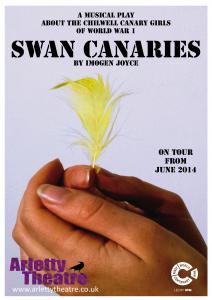
Naturally with this year commemorating 100 years since WWI began there has been a smattering of fringe entries based around this event. What makes this one stand out is that the story is a local one. Swan Canaries tells the tale of life in a munitions factory in Nottingham during the First World War. For those of you who don’t know, in these factories the women filled the shells for the war. The performance gives us a snapshot of four women’s lives inside the factory; the young lover, the widow, the mother with a secret to hide and the teacher turned factory supervisor.
It was a thoughtful production made all the more interesting and emotive with the use of songs from the era. The audience were encouraged to sing along throughout which added a “jolly” feeling from the start. Speaking of, the audience where given small tickets up entering, offered cake for one of the girl’s birthday and when the play began we were spoken to as if we were starting work in the factory. The company made each person feel included as if we were part of the ladies exclusive group. I think that this made each person invested in the performance and the lives which were being portrayed. I was fully immersed in their tale.
The production was imaginative and clever in the way it created the entire munitions factory with just their bodies and 2 stools. Their actions and the staging were simple but effective, seamlessly moving from inside the munitions factory to outside just by a difference in how they moved and where they could walk on stage. Furthermore their use of physical theatre at moments throughout the play added texture to the visual and the story they created.
If all this hasn’t enticed you enough to see Swan Canaries I must mention the acting. Each woman gave a strong performance, they bounced of each other and there were some extraordinary moments between the women, demonstrating that life in the munitions was more than patriotism and yellow hands; there is sisterly love, conflict and family secrets.
I urge you all to go see Swan Canaries, you will laugh, sing, cry and admire the heroic women who worked in Shell –filling Factory Number 6, Chilwell, Nottinghamshire. A thought provoking look in to women’s roles n the First World War.
Toni Saxton
TRIAL BY JURY - PB Theatricals Youth Theatre
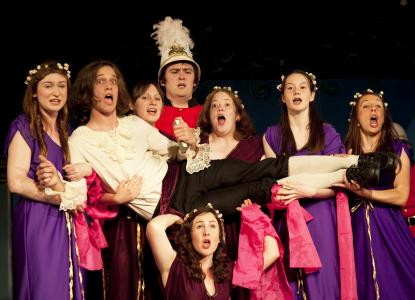
This was a sparkling production which succeeded splendidly even in spite of there being no scenery. The enthusiastic singing readily enabled us to suspend belief and assume that were in the court of the exchequer in 1875 for an action of Breach of Promise when this curtain raiser was first produced.
This is, of course, WS Gilbert's dig at the law and the legal profession. To comprehend the extremely witty lines it is essential that Gilbert's patter songs are clearly enunciated. And for this the youth theatre were extremely well served by the characters of the Usher, the Plaintiff and the Judge. Their articulation was excellent.
Before the copyright ran out on the G and S Operas the dead hand of D'Oyly Carte forbad any changes to the words or music and the performances became ever more boring. Now however changes can be made and ad libs introduced which has refreshed the operas no end. Here for example we had only two jurymen instead of twelve but that did not matter a bit since both of them were fine singers and so the absence of ten jurymen became unimportant.
And musically the production was highly enjoyable with some lovely harmonious singing from the bridesmaids and the defendant's lady friends in the public gallery.
It would be good to see this group again on the Fringe in the future.
Peter Low
BACK DOOR - The Off-Off-Off-Broadway Company

Take a large helping of Hitchcock, a fair smattering of Tennessee Williams, a pinch of Kiss of the Spider Woman – bring them all to boiling point and you have some idea of the taste of Back Door, the spicy concoction delivered up by the Off-Off-Off Broadway Company.
So we’re in Paris in the 1930s, in the Art Deco apartment of Tabitha (Laura Louise Baker), a former photojournalist laid up with a broken leg who spends her days spying on her neighbours and bitchily sparring with young American flatmate John (Polis Loizou). When the impossibly glamorous cabaret star Violette (Jaacq Hugo) moves in across the courtyard, the pair become obsessed with the life of this exotic figure, leading to spying and possibly murder.
Anyone with a passing knowledge of Hitchcock can detect his influence (Back Door – Rear Window, geddit?) but Loizou’s script attacks the subject with the kind of panache we’ve come to expect from Off-Off-Off Broadway in a production with their trademark big characterisation and high production values.
How exciting to see the Pauper’s Pit transformed from its usual black box to a stylish apartment – how daring to include film sequences. This is a company that dares to be ambitious, to challenge the expectations of what can be achieved in a Fringe show. Occasionally mishaps occur, not always does everything quite hold together, but there is ambition here, and originality, and a willingness to plough a furrow that is unique to the company. Long may it continue.
Robbie Carnegie
THE GOOD LADY DUCAYNE - Threadbare Carpet

By Michael Howard, inspired by the story written by Mary Elizabeth Braddon.
Mary Elizabeth Braddon was a prolific writer of novels in the Victorian Era. The Good Lady Ducayne, was published in 1896 in The Strand Magazine. Michael Howard has taken her story and set it around the Buxton area. There are local references for the local people…the Doctor is called Doctor Scrivener and mention is made of Solomon's Temple.
We are greeted in the downstairs of Scrivener's bookshop by Michael Howard, who adapted the story for this rehearsed reading. He introduced the actors and the story began. Bella entered the bookshop that became the employment agency run by Mr Torpinter. Bella needed employment, Lady Ducayne needed a companion, not too well educated but in good health, the deal was done. We were then invited upstairs and listened to the story unfold. Paintings added a visual dimension to the reading; they illustrated key points of the story. The music that accompanied the piece was lovely. It added a real atmosphere to this intimate setting; I especially liked the Doctor adding some percussion with his instruments!
The good lady was old, so very old, but Bella's company seemed to give the old lady a new lease of life. We all know the path of traditional vampire stories and this reading held no real surprises there. Mr Howard, however, was keen to point out to us that this tale was published the year before Bram Stoker's Dracula.
I think that the old lady make-up was too much for such an intimate setting, Poppi Dee captured the character of Lady Ducayne with her voice and mannerisms, so the stage make up could be toned down. I would also like to have seen this piece performed as a play, scripts down, more use could then have been made of eye contact with the audience to really draw them into the tale. That being said, on leaving, the audience seemed to have thoroughly enjoyed themselves.
Jayne Marling
SHREW - Ami Jones
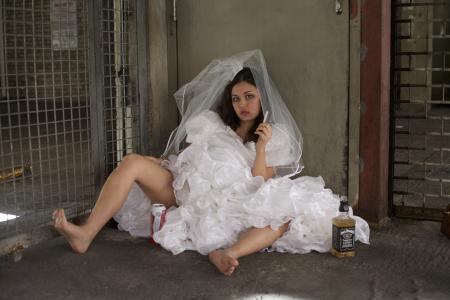
A very powerful and moving performance by writer and performer Ami Jones and she takes us through the life and times of Kate/Katherine/Katerina/The Shrew. She is alternately railing, thoughtful, happy and sad as the realisation dawns on her that this is the life she has always been meant to live and as she feels the hopelessness of not being able to change any of it - or can she?
We are given an insight into how Kate feels about the rest of her family - her boring father, not worth giving any time to. Bianca, her sister, who is nothing short of a thorn in her side, with her endless line of suitors, her simpering and her numerous children. It seems to Kate she is endlessly pregnant. Lucentio who may well have been duped when he married Bianca - at least Kate's husband, Petruchio, knew what he was getting himself into!!
And what of Petruchio? Did he succeed in 'taming the shrew' or did he just think he had?
There is crossover between Shakespeare and modern life. The writing and performance was amazing, with interaction and engagement of the audience. The set is simple and very effective, offering ,as it does, both receptacle for props and costume, but also a platform from which Kate can emphasize the point. The Paupers Pit is a terrific venue for this kind of production.
This is probably the best offering I have seen at the Buxton Fringe; it completely blew me away. I had only sketchy knowledge of the story of Taming the Shrew but that was OK, in depth knowledge is not required. I am finding it difficult to describe this without lapsing into gushing superlatives. Just get yourself a ticket and see for yourself. It is fantastic!!
Enjoy the rest of the run here Ami and up in Edinburgh and New York. This is not the last we will see of this extremely talented young woman! And congratulations to all who are involved in this excellent production.
Linda McAlinden
SOIREE - Fiction

Soiree
Sometimes in the Fringe it’s reassuring to see something that doesn’t attempt to be ‘out there’, or to tackle the wrongs of the world, but instead sets out to be simply that most old-fashioned (but often hardest to pull off) of concepts, a well-made play.
Soiree is such a production. Written and directed by Lizi Ashcroft, it follows one night in the life of the fussy control-freak Oscar (Dan D’Henin) as he and his wife Faye prepare for a dinner party which will bring his boyhood friend Mark (Zac Aimson) back into his life. Further fuel is added to the fire by Oscar’s wild-child sister (Cat Shaw) and her husband Harvey (Jack Ashcroft). In some respects I found it reminiscent of the Kenneth Branagh film Peter’s Friends, where a group of 30-somethings come back together for a weekend that sets the cat amongst their respective relationship pigeons.
D’Henin is particularly strong as Oscar – in the early stages perhaps a little too strong; at times he plays it a little broad and consciously comedic – but his performance becomes much more subtle and nuanced in the second half. Likewise Shaw and Ashcroft should be commended for throwing themselves unselfconsciously into the physical aspect of their tempestuous relationship.
Lizi Ashcroft’s script certainly shows promise, but, with no disrespect to the cast, who grab their roles with both hands, it might have been better served with more mature actors – to say nothing of needing to be believably ‘Southern’, considering the disparaging comments made against Northerners in the script. It is certainly a script that deserves another airing, but perhaps with more tweaks along the way – at times it felt like a 3-act play with the second act, the dinner party scene, missing. At times the action moved a little quickly, where a slower burn might have been more effective (such as in the sister and brother-in-law’s flirting with the guests). This is not to criticise the script, merely to suggest some ways in which something already promising can grow or improve as a work in progress.
Robbie Carnegie
OVER THE GARDEN FENCE - Haylo Theatre
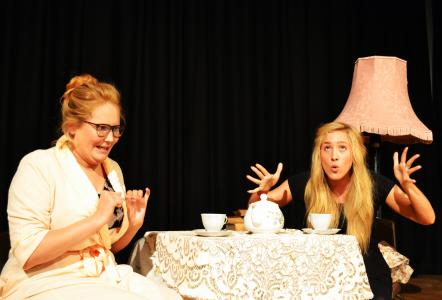
‘Over The Garden Fence’ showcases the considerable talents of Hayley Riley and Louise Evans in a tale of memories and loss, tears and laughter that will surely live long in the minds of many of us lucky enough to witness this Fringe gem - and sadly there are to be no repeat performances this time around. This is the first production by the Haylo Theatre company but I very much imagine it won’t be their last.
It is a simple enough tale - following her increasing dementia, Dolly Griffin is leaving the house she has lived in for 64 years to move into a home and is being helped by her granddaughter Annabelle to gather together a few treasured belongings to take with her. In the hands of these two assured actors things are by turns both moving and funny and as objects are sifted, we are regaled with stories ranging from a kitchen mishap resulting in an unintentionally vegetarian Christmas dinner to Dolly’s romantic first dance with her future husband Geoffrey. In one particularly moving scene, a childhood birthday party is soured by news of the war and scenes of birthday exuberance are intercut with slow motion enactments of frontline horror - at first recreated by them both but particularly effective and chilling when Dolly is experiencing horror whilst Annabelle is smiling and laughing along to the strains of Happy Birthday.
These versatile actors also show us the various “concerned” neighbours who delight in keeping the family informed of her increasingly bizarre behaviour - “She was outside in her slippers … nothing but her slippers”.
The acting is impeccable throughout with the production using the specifics of Dolly’s own experience to explore more universal themes such as the way memory can be so powerful that it can feel “more real in your mind than what you see”, despite being housed in the “fragile library of the mind”.
This was an excellent hour of Fringe entertainment. If you missed it, there is a chance to see it at the Bollington Arts Centre on Friday 14th November.
Dan Osborne
ONE WAS NUDE AND ONE WORE TAILS by Dario Fo - Sudden Impulse Theatre Company

One Was Nude and One Wore Tails is completely bonkers and yet, from the beginning and indeed throughout the performance, there is an underlying theme of identity. Who do you think you are? What do you look like and can wearing a suit with tails really change your identity? Now don’t be mistaken in thinking that because philosophy is involved the performance is dull; this is very far from the truth.
This performance is 45 minutes of fun, philosophy, and road sweeping, - there’s even a musical number to watch out for with percussion on a wheelie bin! Dario Fo's witty play is thoughtful, sarcastic, funny and based on fantastic and ludicrous characters. This treasure box of people is brought to life by a lovely, animated cast showing great comedic timing.
I don’t want to say too much as it would ruin the surprise of the performance, but I thoroughly enjoyed the Mario-esque moustache on one of the characters, the man in the top hat, and how they made philosophy accessible to the everyday. The play also contained a couple of lessons; I learnt that dancing with a broom can get you out of many a situation and that wheelie bins can create a fantastic stage exit.
I went in not really knowing what to expect and in all truthfulness a little sleepy at 10.30pm. What I experienced was a wonderfully random production full of quirky characters, storylines and events. I was entertained from start to finish and would urge you all to go and see for yourself how two road sweepers, a woman, a couple of a wheelie bins, some flowers and an smattering of philosophical thought can create a fantastical production.
Toni Saxton
IN THE PENAL COLONY by Stephen Berkoff after Franz Kafka - Sudden Impulse Theatre Company

One of the great actor/writer/director Steven Berkoff’s earlier works, his adaptation of Kafka’s In The Penal Colony, was brought unflinchingly to the Paupers Pit by Sudden Impulse and proved one of those uncomfortable, in-your-face productions that the venue is memorable for each year.
The Explorer, an observer of a foreign justice system, is introduced to the intricacies of a massive torture/execution machine by the officer who maintains it and who tries to continue its use in the face of government opposition. The machine dominates the stage – a massive wooden and metal structure around which the cast have to negotiate in the cramped surroundings of the Pit – and similarly dominant is Richard Shields’ officer. Shields adopts a suitably Berkovian (if that’s the adjective) inflection: drawled vowels, clipped consonants, sudden shouty words – which power through the huge amounts of description of the horrors of the machine. And these horrors are all in the words – like any good torturer, the Officer (and Berkoff) know that the worst thing is to ‘show the implements’.
However, Sudden Impulse layer onto this a further patina of violence and degradation, meted out by the Officer – and more particularly his subordinate, the Guard – on the Prisoner and each other. Director Simon N W Winterman clearly is portraying how a society in which human rights have been put aside can become corrupted from top to bottom, but the remorseless realism of this brutality (where I believe Berkoff would have envisaged a more stylised approach) proves alienating to an audience. There is often a streak of nastiness and cruelty in Berkoff’s plays – the key is to try and find that nugget of warmth, of humanity, that will draw an audience in.
That said, this is a timely revival of the play, in a world where our own politicians debate whether absolutes of international human rights should be allowed to trump domestic judicial policy and where international condemnation appears impotent in the face of human rights violations across the globe.
Robbie Carnegie
WILDE WITHOUT THE BOY - Gerard Logan
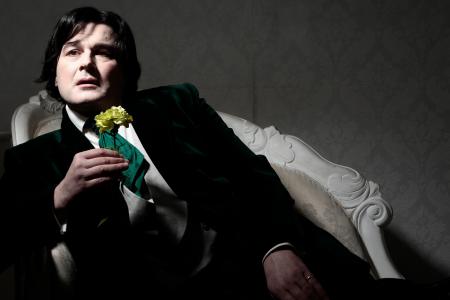
Arts Centre - 20th July 2014
Wilde Without the Boy is an honest, eloquent and sometimes uncomfortable journey into one of the most witty and controversial writers of the late 19th century - Oscar Wilde. The play is a presentation of De Profundis, a heartfelt yet spiteful letter written to his lover.
Without a doubt actor Gerard Logan portrays Wilde in a very accurate and sympathetic light. His performance oozes wit, intelligence and pain. The range of emotions Logan portrays is astonishing - at one moment Wilde is sharp and has a distinct hubris in his character (especially when discussing the letter’s recipient whom he calls “pathetic” on many occasions) but in the span of a few minutes can change into a miserable, weeping train wreck mourning the loss of his mother. Every sentence is delivered with the exact tone and mannerism one could expect out of Wilde himself. Logan completely engrosses himself into the role both in appearance, posture and behaviour. Logan also does a spectacular job in getting emotional responses from the audience. I felt genuinely uncomfortable when Wilde would recall traumatic experiences in his life and felt angry whenever he spoke about the betrayal he experienced from his lover. I felt I wasn’t watching someone play Oscar Wilde; I felt I was watching the Oscar Wilde.
The play is also an excellent look into early gay relationships. Throughout Wilde’s only concern, so he says, is his art and beauty in it’s many forms. Later on in the performance Wilde is defending a sincere poem he wrote for his lover and he calls love between two men “genuine love” and something that is just as beautiful as any other love. I felt touched by the statement and by the performance of it.
The simple set does wonders for the performance as it keeps the audience focused on what’s truly important - Wilde himself. The lighting was also very atmospheric dimming when Wilde was recalling something tragic and/or upsetting. Throughout they use sound clips of people talking during Wilde’s trial - I wish this had been utilized more as it created an unsettling atmosphere, which was reinforced by Wilde’s reactions.
Overall Wilde Without the Boy is a stunning performance by a very talented actor. By the end you’ll be wanting to meet the real Oscar Wilde.
Katie Ryde
CORIOLANUS - Uproot Theatre Company

This new adaptation of Shakespeare’s classic tragedy by Richard Wiseman intrigued me from start to finish. I couldn’t wait to see what he had left in, or rather, what aspects of the original he wanted to focus on. For those of you who do not know, Coriolanus, follows the story of a Roman War Hero Caius Marcius Coriolanus who has fought and won many battles for Rome and what happens when he is encouraged to run for consul. Will he lead the people? Can he lead the people?
I thoroughly enjoyed Wiseman’s beautiful adaptation, condensing any Shakespeare play in to one act is no mean feat and he did this with obvious thought and attentions to detail. In turn Wiseman ensured that the audience could follow both the political story of Rome and the personal stories of the characters.
Not only that Wiseman also starred in the production taking on the roles of Menenius Agrippa, Coriolanus’ friend and also a senator of Rome. Wiseman captured the whimpering political personality of this character with humour- I enjoyed finding him irritating. He also undertook another vital role as Tullus Aufidius, general of the Voicisan army, Rome’s opposition. Wiseman showed his diversity in performance between these two characters, Tullus was a common man, who seemed to be a man of the people, yet not to be trifled with. I believed both of his characters convictions and enjoyed seeing how they attempted to interact and to an extent manipulate Caius Marcius.
The other half of the cast is made complete with Jamie Robertson. His performance of Caius Marcius was thoughtful, complex and powerful. He demanded my attention from the moment he stepped on stage. Robertson’s portrayal of this character is that of a lion, which is continuously ready to pounce; particularly a lion as Caius has both ferocity and a regal pride that comes from his Coriolanus nobility and birthright. Robertson’s performance allowed the audience to see the complexity of emotion behind such a beast; Caius was not just a war machine, he loved his friends and his country – on paper a perfect leader of the people however, can he be tamed?
Throughout the performance Caius constantly battles with ‘the people’, they provide his opposition and generate much of the conflict for our tragic hero. The audience were often addressed as ‘the people’ both of Rome and of Voiscian, this put onus on us to answer questions that were put to us and in such an intimate performance space of the Pauper’s Pit it kept us engaged with the dialogue and subtext within the performance. Once more highlighting an aspect of the intelligent writing and directing.
This production resonated with me not only as a lover of Shakespeare but more so due to the current political climate we are part of in 2014. Through exploration of Caius Marcius Coriolanus on stage it made me question what place war has in the world? How war changes people? Are people drawn to horrific conflict and once being part of war does it ever leave your soul? Can a soldier truly move on from a war? What does it mean to be a war hero? What power do ‘the people’ have in war?
I cannot speak for the other ‘people’ in the audience, however, I cannot wait to go and see this production again. I have a feeling that more questions may arise, some may be answered but above all I will have another evening of mesmerizing theatre. Do Not Miss going to see Coriolanus.
Toni Saxton
THE RAILWAY CHILDREN - Crowd of Two Theatre Company
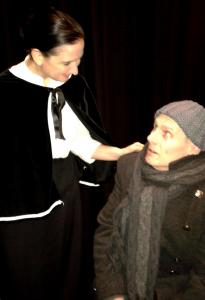
How can you present The Railway Children, with only one child? As a fan of the classic novel I was intrigued to see John Dunne’s unique adaptation. I’ll admit, I had doubts on how they could make the story work with just Bobbie as the main character, but I was pleasantly surprised! The story was cohesive, intelligent and highly entertaining… we were, on many occasions laughing out loud!
The play starts with a direct address from Roberta and through her narrative we soon learn that The Railway Children is being presented as a play within a play. This may sound confusing, but it works brilliantly – the characters even make light of the fact that it focuses on just one child, and they do so in good humour – adding to the entertainment factor. As the play only features four actors they have the difficult job of playing multiple characters, in a way that does not disrupt the flow of the performance or trouble the audience, yet they take on this task with great success.
What I loved most about the play was the actors themselves. Each one was focused, energetic, expressive and emotive, all of which really contributed to the engagement of the play – I was truly gripped throughout! Nicola Haldane portrayed Bobbie perfectly, a heartfelt and expressive performance that had a twist of humour to it too! Equally as impressive was Daniel Jeffrey, who played Mr Perks and the Stationmaster - his characterisation was superb. I truly loved his character, and so did the audience! He had us laughing one moment and then clapping the next. Getting the audience involved is something I really value when seeing a production and The Railway Children did not disappoint! Tamara Hall, who played the mother, was also brilliant – being expressive, humorous and emotive is a hard task but she did so naturally. Russell Kennedy who played Mr Szcepansky and The Old Gentlemen was also fantastic in his performance. It was such a pleasure to see these talented actors at work and I look forward to seeing more of the Crowd of 2 Theatre Company.
The Railway Children is a play that explores complex themes such as childhood naivety, innocence and family difficulties whilst keeping the charm of the novel. Engaging clever and unique, The Railway Children has it all! Don’t let the fact that there is only one child character in the play put you off, for it is this that makes this play what it is – original and entertaining. So, whether you love the novel or not, go and see this adaptation, you won’t regret it!
Sarah Gunton
AFTER ALICE - Orange and Pip Theatre

The audience enters to find three young women on stage, texting. They’re surrounded with the type of clutter familiar to any parent of teenagers; magazines, make-up, bags. These are Alice’s friends, and they are getting ready for her funeral. Their job now is to decide how best to present their emotions towards her death via Instagram – on one hand people will expect them to be distraught, but some of them are tired of saying they loved Alice just because she was ill.
The play deals with a lot of concepts familiar to a young society running on modern media. The constant threat that you have to stay skinny, secret rivalries in friendships for who can gain the most attention, how to be exactly what people expect so as not to offend anyone, and whether or not it’s appropriate to wear red lipstick to a funeral (fun story; I’d been to a funeral the day I saw this play and did wear red lipstick, so I hope so.) The script is excellent, battling through the ups and downs of the group, and slowly peeling away the images the three girls want to portray to slowly reveal what really lies beneath. Each character is very different; no one has resorted to stock teenager character tropes, although the characters can occasionally be a little two dimensional.
The play varied between action scenes with a lot of dialogue, and the three actresses taking it in turns to perform extended monologues, while the other two used mime and freeze frame sequences to bring the words to life. Some of these sequences did come across a little like textbook student theatre but the more natural scenes came across accurately; a group of teenagers bickering about what to do, each trying to prove themselves right. There was a good use of pause, it was understood that sometimes there is a need for a moment of silence.
None of them seemed at all nervous, and despite the script holding a lot of dialogue, no one once stumbled over their words. Although some of the direction was a little routine, the three actresses; Poppy Forshaw-Perring, Annie Osborne, and Lilly Posnett, are clearly quite talented. This is a challenging ensemble piece which deals head on with some rather taboo subjects in a very brave way. It isn’t delicate, and doesn’t step around the subject, but rather speaks from experience about what it’s really like to throw yourself down the rabbit hole.
Ariane Dean
LAPSE - Shadow Syndicate

What a show! Lapse has taken me on an emotional roller-coaster; this clever and contemporary show illustrates how one event can ripple and cause others to occur. With a small ensemble of just six young actors people may ask if they would be able to honour such a dramatic event in which 9/11 was. The answer is YES, I’m mind blown over how the actors can put such emotion into a piece. Incredible! Throughout the show I was on the edge of my seat, with twists throughout, the piece of drama kept the audience engaged, in which you could hear a pin drop.
Whilst reading ‘Lapse’s programme I looked endlessly for the writer, so I could praise the respective person, however what I found shocked me! Shadow Syndicate’ performers in which I watched this afternoon wrote and created the production themselves. That is remarkable, for all the work they have done, the end result is perfect. The obvious hours the actors have clearly put in has most certainly paid off. The two protagonists’ Danny and Natasha played by Alex Brown and Emily Beach respectively were remarkable, the emotion and characterization in their characters was so impressive. Alex Brown produced a stellar display playing a somewhat monstrous, vindictive yet misunderstood character; he invoked layers into his character that I didn’t know was possible for a performance of forty minutes. Well done Alex! Emily played the innocent Natasha who fell for the charms of Danny due to their apparent similarities. The loss which she suffered was prominent during the course of the play with her becoming manipulated by Danny to become a ghost of her original character. Emily’s acting was impressive and showed the modern issue of abuse in a relationship- a truly amazing job! Gabi Allwright and Morris Findley played the moving characters of the victims of 9/11.They were played spectacularly, somewhat ghostly, with their desperate shouts to the antagonists leaving goosebumps on my arms. The last of the ensemble include Matthew Blomefield and Marie Walker, these two perhaps being the heart of the show taking on multiple roles, produced emotion in each of their displays. This play worked spectacularly because of the relationship between all of the actors, huge congratulations to all.
‘Lapse’ is a play involving modern and dynamic issues in which many can relate to. The act was cohesive from scene to scene, and the use of props was impressive had a thought whilst watching the play that a lot is known about 9/11, with many remembering the victims. However this thought provoking production made me wonder who really are the victims, the deceased or the families left behind? This production is fresh and well worth a watch, you’d be a fool to miss it.
This play is different to all plays I have ever watched; everything was perfect-the use of lighting echoed the mood, thought-tracking was used-showing the audience a character’s true nature, therefore the audience were drawn into the play. Several other drama techniques were also used such as ‘marking the moment’ and ‘spotlight’ these techniques demonstrate how refined the actors are as a production whilst also allowing us to see how one moment can truly change the course of lives forever.
Lois Rushworth
ASYLUM - Dilate Theatre
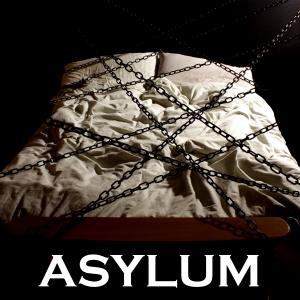
18/7/14 Buxton Community School
Keith Aisner’s Asylum is a psychological comedy/drama about a young man, Gary, who decides he wants to find the key to happiness by searching deep inside himself through perceptive dreaming.
A highlight of Dilate Theatre’s adaptation was its comic timing. A performance that stood out in this respect was Amy Louise Jackson’s portrayal of Gary’s mother. Particularly memorable was the scene is in the second half of the play where Gary is battling with two sides of himself, the happy and loving side and the fearful, angry side. We see her and Gary along with the Salesman having tea together. An embarrassing and over-concerned parent, she is determined for her son and the salesman to get along. The scene's comedy lies in the fact that we can all relate to this and it makes us reflect back to our childhood.
Of the performers, lead actor Ivan Orson Kelly who played Gary really stood out. Throughout the performance you could see that he was leading all of the other actors through the play. His best moments came in the second half of the play when Gary’s version of reality and fantasy has become so warped that he can no longer tell the difference between the two anymore. The acting in these scenes is both subtle and comic. Kelly’s portrayal of Gary on the verge of a nervous breakdown as he battles to get himself out of his current predicament is very moving.
The psychological elements in the play were extremely thought provoking. One of the ideas explored by the play is that of losing a sense of reality. When the audience watches the play there is so much happening inside Gary’s head it makes you think about your own dreams and you too find yourself becoming immersed and disorientated in a story where the boundaries of dream and reality are blurred. You can relate to Gary and understand his desire to get away from everyday life. Throughout the play Gary is dealing with binary oppositions inside his own head. The characters are personified by society as God versus Satan but for Gary they are personified as his Mum versus Salesman. These personifications are thought-provoking and raise some interesting questions, making the audience question who would personify their own good and bad sides.
The Dilate theatre company have pulled off a poignant and moving play.
Phoebe Alderson
FIRST CLASS - Aulos Productions & Relief Theatre

A teacher, a young mother and a professional tennis player are sat on a train. The respective journeys that lie ahead of them are not only life-changing, but the very stuff of life itself. This is a train journey to Manchester Piccadilly, stopping at guilt, blame, regret, depression, love, desire, and fear … and that makes for a long, emotion-packed journey within a relatively short space of time.
The three young actors - Joe Walsh, Maddie Haynes, and Erin Elkin – who embark on this journey are not only well-cast, but each of them approach their roles with dedication, commitment and performing skill that belie their years. Their characters start as vignettes, but grow in dimension and verisimilitude as the play progresses. Maddie Haynes as the tennis player faultlessly conveys the tension and pressure bearing down on the professional sportsperson. Joe Walsh perfectly embodies the stress felt by all teachers, especially when confronted with difficult pupils. The expressive and animated performance of Erin Elkin carries all the tragic hope and broken dreams of a young woman who ‘fell pregnant’ at a time when nice girls just didn’t do that sort of thing. All three of them deliver expertly-judged, naturalistic performances within a non-naturalistic setting.
This is essentially a series of interconnected monologues; for these three individuals exist in different times and the attitudes of those times inform their characters. Each actor also plays another character in another’s reality, as well as sundry other rail staff. This is ensemble theatre at its best; fully of precision in both characterisation and delivery, and subtle communication with an overlapping narrative that whipped the story along with a mordent wit that never over-embellishes the story.
James Beagon’s script is a masterpiece of understatement, leaving the audience to do just enough work to keep one step ahead, but never quite allowing them to second-guess outcomes. The only weak point in an otherwise faultless script was the ending, where the interconnectedness of all things is shown in a very literal way. It didn’t need it. The point had already been made, and very powerfully, too.
First Class (not sure about the title, either. Sorry) encapsulates what fringe theatre does best; maximum imagination with the minimum of resources. With three chairs, straightforward direction and simple lighting and sound, Relief Theatre guide us on a complex, subtle and at times deeply moving journey into the human psyche. In concentrating on the specifics of individual lives, universal questions form about what it means to be a parent, a professional, a human being.
First Class runs for two more performances (19th & 21st July) and is highly recommended.
Malcolm Lomax
THE GHOSTHUNTERS' CLUB - Cul-de-sac theatre company
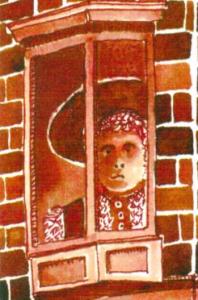
If you sign up to the Ghosthunters' Club at Scrivener’s second-hand bookshop, you are in for a marvellous treat.
I was welcomed at the door by Professor Tony Stoney-Middleton and Miss Pringle who prepared us for an evening of mystery and suspense, provided us with a pseudonym and gave us ectoplasm to ward away the evil spirits. Our group of 12 comprising of such characters as Matt Locke, Dora Dove Holes, Sir Peveril Castle, Miss Marple and Mam Tor were taken up and down the creaky staircase, in and out of cosy rooms and squashed into some very dark corners where we encountered some strange ghostly goings on. Audience participation is a key part of this theatre and we enjoyed a lively session of calling up the spirits before meeting the Book Lady, Annie Boleyn and Edith, the resident ghost. There is lots of interaction not only with the Professor but with the books themselves that had their own stories to tell. I won’t spoil your experience by telling you them all; you will have to visit yourself.
Scrivener’s provides the most fabulous setting for this eerie encounter with small dark corners, twists and turns, nooks and crannies and its massive collection of books all tucked away in a quirky old building from cellars to attics. The very eccentricity of the building fuels the imagination and our hosts provide a brilliant job of letting it run riot!
This is a must for any visitor to the Buxton Fringe, delightful entertainment, amusing and pleasantly spooky! There is also an opportunity to browse the shelves and buy the ghostly book about Edith.
I am thrilled to report that I have now been certified – as an official Fellow of the Royal and International Ghost Hunters' Team – with a certificate to prove it!
Book your ticket soon as it is limited to 12 and is repeated only tonight and Saturday.
Sandra Cooper
STICKY LABELS - Lady Parts Theatre

This is a late addition to the printed programme but it would be a great shame if it was overlooked.
John Dayton and Annabel Entress put in wonderfully naturalistic performances as Dan and Lucy, a couple who meet through online dating but whose relationship is complicated by secrets on both sides.
Dan is still reeling from a court case some years ago brought by the parents of a 15-year-old with whom he had sex. We learn that he met her in an over 18s night club and that she claimed she was a university fresher. He was cleared ‘on a technicality’ according to the papers, but as the title suggests, labels stick and he feels he can never escape the taint of paedophilia.
In this powerful new play by Laura-Kate Barrow, inspired by similar cases where figures have been named and shamed before finally being cleared, our sympathies are meant to be entirely with Dan and actually mine were, but it is an emotive issue and with more and more facts being unearthed about Jimmy Savile, Rolf Harris et al, some audience members may experience a more complicated reaction.
Lucy meanwhile has not revealed that she has teenaged children. How will Dan react when she finally lets him know?
This is very sensitive new writing and not without delicious humour as the two, at least at first, share a tender, funny adult romance. The company announced at the beginning that this was a work in progress and was eager for our feedback. I would suggest that the only thing that would improve it was a little more confidence in delivery. One audience member suggested that Annabel could speak up a little (dishwashers in full spate upstairs didn’t help) and though others felt this was not an issue and I didn’t actually miss any lines, I agree that more projection would be a good thing.
A word too about the direction by John Young. This could have been a very static two-hander but the positioning of the actors and their minimal props of two chairs was very well thought out adding to the impact of the whole.
Sadly there is just once more chance to see this thought-provoking, emotional play. Catch it this Saturday at 1-2pm at Underground Venues. And Lady Parts, stop calling it a work in progress – you got there!
Stephanie Billen.
PROFESSOR HARRY STOTTLE'S MUSIC HALL EXTRAVAGANZA - Stage3 Theatre Company
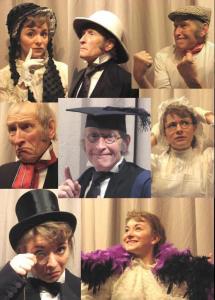
Within the first few bars of ‘The Old Bull and Bush’ being played the audience were singing along and continued to join in this production with gusto!
Professor Harry Stottle (Mike Brown) and Miss Katarina Immensikov (Catherine Pugh) take us through a potted history of the heyday of the British music hall. The mixture of songs and monologues brought back happy memories of ‘The Good Old Days’ from the television.
This exciting, extraordinary, excellent, extravaganza starts off with favourites such as ‘The Boy I love’ and ‘My Old Man’. We are then guided through, patriotism, courtship and married life, which were the main themes of the shows of the time. Some of the language and sentiment reflect the thoughts and feelings of the time, and would probably not pass the PC police of the 21st century.
Both Mike and Catherine are terrifically expressive performers. Their recitations very vivid, varied and versatile. For the first time I heard the whole of the ‘Green Eye of the little Yellow God’ and I finally know who Gunga Din is!!! And of course we had that all time favourite, the sad saga of the Ramsbottom’s trip to Blackpool Zoo ‘The Lion and Albert ’.
Catherine’s beautiful singing voice and acting expertise give the songs something extra – I particularly liked ‘Now I have to call him Father’ and ‘Burlington Bertie’. And from Mike ‘I’m shy Mary Ellen’ was very poignant.
Upstairs at the Old Club House lends itself very well to this particular production and all in all an hour and a quarter spent in good company, with consummate performers, a bit of a sing song and lots of laughs. What more could you want? I would highly recommend this show, as one audience member said ‘it was excellent and really good value for money’. Thank you.
Linda McAlinden
WOW - Craft Theatre Company

The Loft, Market Place (venue 99b)
This single-act, one-woman play written and directed by Sian Dudley is a seemingly rare thing - an exploration of comupter gaming and its impact on 'life' from a woman's perspective. For that the creator should be congratulated, yet it is also something more familiar. For the most part the story this is a story of addiction - but with added technology and ethics.
WOW, for the uninitiated, is World Of Warcraft and is a role-playing game. It has many millions of players and afficionados across the world and is has a somewhat negative image among those who don't play. This drama tells a tale - the tale of a young person with a bright future ahead of them being sucked into a 'world' where the humdrum of daily routines and a meaningless job is replaced with titanic struggles with implacable foes, heroic deeds without end and comarades-in-arms who would lay down their life for you is not in itself new. You might recall episodes of Red Dwarf, Star Trek and other sci-fi showswhere computer games/virtual reality and their role/impact on what one might think are 'vulnerable' people have repeatedly posed the same dilemma and asked similar questions for us to ponder. This show is an addition to that canon.
The story is well written and acted, has many humourous touches and the author has clearly researched the subject. The central character, Sarah, would fit right in with the boys of Big Bang Theory and millions of others as they play WOW on-line oblivious perhaps the the world around them. The show was warmly recieved and the audience clearly liked it. If you like this type of drama, WOW is on again on the 18th and 19th of July.
Ian Parker Heath
CROSSROADS - CHS Youth Theatre Company

Wednesday 16 July 2014 7 – 7.45pm
Your attention is engaged from the very beginning as the cast enter asking how your day, week, life is and is it perfect, or do you spend time wishing for the ‘perfect’ life, ‘are you at the Crossroads’?
‘Dad’ has a perfect life, perfect wife, mistress, children and job – or does he? Has it always been this way? Or was there a point when he made the deal of a life time? Is he even aware?
This energetic and enthusiastic presentation of this Christopher Rowley play is brilliantly presented by an amazing group of year 10s (14 year olds) from Chapel High School on their debut at the Fringe. This age old tale, with a modern twist is terrific fun and thought provoking – which would you choose, good or evil, the hard way or the easy way?
It would be unfair to single out any one performance they were all excellent and clearly worked as an ensemble and had fun doing so. The blurb stated ‘they are a creative bunch who are up for a challenge’ – they most certainly are. Challenge met and excelled. The dialogue moved on at an appropriate pace, rapid and punchy or slow and thoughtful as required. The sound effects / music added to the overall experience as did being performed on the altar of the United Reform Church with the stained glass windows behind.
Well done to Jayne Marling, the Director, and all those involved.
A real treat. This is youth theatre at its best. I hope you will come again.
Linda McAlinden
CAROLINE - Buxton Drama League
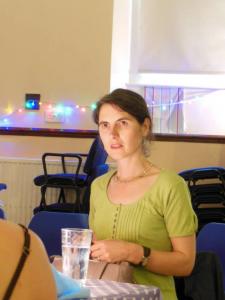
‘Caroline’ by Toni Saxton, is a beautifully written tale of heartbreak, guilt and loss that explores difficult issues whilst remaining engaging and thought provoking. Walking into the church hall, the setting is small yet comfy, surrounded by fairy lights and soft music, Caroline’s story begins. What I really loved about the setting was the proximity of the audience and performer. With seats set out in a circle around the coffee shop setting, the performance had an intimate feel which meant the audience became more involved, we were able to sit back and listen to each character’s story whilst forming our own opinions – an aspect which I very much enjoyed.
The story itself centres on a mother, Caroline, who, consumed with guilt, blames herself for her daughter's death. With no one else to turn to she flees to a nearby coffee shop where she meets a young barista, who is struggling with troubles of her own.
As the story develops so do the characters, we watch them come to terms with guilt, ask those heartbreaking questions that come with the unfairness of loss, and most importantly, we see them help and guide each other through the pain. The story line is a complex one, exploring the troubles of teenage love as well as the conflict surrounding family relationships, so be prepared for a roller coaster of emotion! What really stood out for me was the actors themselves – each one gave an emotive and moving performance, which I could not fault at all! With the nature of the story, the actors had to show a range of emotions, from anguish to anger and heartbreak to guilt… and they did so perfectly. Maria Carnegie, who played Caroline, truly embraced her role as a grief stricken mother and as a result her performance was convincing and heartfelt. Likewise, Ioana Voisei played the barista wonderfully – an excellent portrayal of a character that initially is there to help a grieving mother, and in the process finds help herself.
Fast paced and heart-warming, Caroline has it all! So what are you waiting for? Join in and watch her story, be there and see it unfold as the characters delve into guilt and sorrow, witness the characters grow as they come to terms with their issues. Another fantastic piece of drama from Buxton Drama League – I highly recommend.
Sarah Gunton
THIS WAY MADNESS LIES - Augustus Stephens

Any show that offers nudity is seemingly seen as ‘difficult’ or ‘sensitive’ Quite why this is, is sometimes hard to fathom. Take this show for example; it is quintessential Fringe (including that other one). In it, Augustus tries to document his travails from unrequited love to psychoactive medication via his own Reggie Perrin moment.
It is by turn quirky, idiosyncratic, humourous, vulnerable, self-deprecating, honest and yes there is nudity. It is not gratuitous as we often see in our daily bombardment the various media. It is a central part of the story told here by a man not afraid to tell us of his troubles, and they are troubles any one of us could experience at any time.
There are many things to like in this show and nothing to dislike. If I was to try and compare it to anything I could be hard-pushed to come up with many examples. Reggie Perrin sprang to mind and some of the shows seen here at the Fringe by Mark Gwynne-Jones in the past and Carol Robson this year. If Syd Barratt hadn’t become reclusive he may have penned some of the tunes here. I think we all laughed at the portrayal of the Derbyshire Police in a redneck drawl – just so unexpected! There are quite a few moments of fun to had whilst our storyteller reveals more - pun intended!
You know, some reviews are difficult to write and you nearly miss the deadline – this one wasn’t one of them. Do not be put off by the nudity warning. Do go and see this ultimately heart-warming show by a brave man. He’s on again at Underground Venues (venue 10).on the 18th and 21st.
Ian Parker Heath
BLUE REMEMBERED HILLS by Dennis Potter - REC Youth Theatre

REC Youth Theatre Company Arts Centre Studio 14th July 2014
Potter’s play is set in The Forest of Dean in 1943. It is the story of how a group of seven year olds form alliances through play. It is a tale of lost innocence and how violence in the world can corrupt young minds.
The era of the piece was effectively set from the start with music and costume. The forest and barn were simply staged and worked well for the space. The use of lights to depict different areas on the stage was an advantage.
The acting as a whole was exceptional. I have to admit, I did have my doubts as Potter wrote this play specifically for adults to play children and maybe added age would add depth to their performances, but I think the group really rose to the challenge. You even got away with Willie being played as a girl, as Siobhan Piercy played her tom-boy character so convincingly.
The gang were full of rivalry and energy. Each actor played their roles with great attention to gesture and voice. I have to commend the work on accents! Well done to you all you managed the Forest accent with great confidence.
From the first moment the lights came up on Donald he painted such a perfect picture of vulnerability. James Chetwood showed to the audience a character who was damaged by the war. He needed a friend, but the world can be a cruel place.
I think the strongest moment came when Donald and Peter were in the barn together. Their relationship was full of awkward understanding, at this point you really want things to be alright, but Peter once again tries to prove he is top dog. I totally believed that Alex Paul, who played Peter, was a seven year old, his mannerisms and tone of voice were excellent.
If I was to be picky then I would like to see Peter make his hair more 1940s as it looked out of period compared to the others, but that really is a minor point in an excellent piece of drama.
Most versions of this play I have felt really angry with the children, but here I just felt really sorry for them all, it really did feel as though their innocence had been lost.
Jayne Marling
16th-17th July 9.30-10.30 ArtsCentre-Studio
WAITING FOR GANDALF - Chris Neville-Smith with Durham Dramatic Society

As a lover of the works of JRR Tolkien and the subsequent Peter Jackson films I was very much looking forward to this production. I didn’t really know what to expect and to be honest I am still not sure about what it was I went to see.
Waiting for Gandalf takes place whilst Kevin, an avid ‘ringer’ waits for Gandalf to sign his latest movie companion book. Kevin introduces himself to us and tells us about what he loves about the world of Middle Earth, from the books, the films and even the music score. I enjoyed Kevin’s innocence and the way in which he describes the brilliance of escaping from reality in to another world. It reminded me why I love literature and why I love theatre.
Why Kevin needed to escape is what the performance is truly about, in essence Kevin needed to escape or distract himself from a personal tragedy; a tragedy framed by current social and political issues. From this perspective the performance was brave and how much to indulge in these meaty issues was carefully considered.
However, despite enjoying Kevin’s endearing innocence, the references to Lord of the Rings and the bravery of the subject matter, there is something I have been trying to put my finger on which was just not quite right. All in all I think the performance would benefit from a fresh pair of eyes in rehearsal to ensure that the performance stays present and feels less rehearsed. Additionally a revision of the script may also help achieve this. The storyline is interesting and I like that that ending wasn’t fairytale, yet I think that it could be improved by revising what it is you really want the performance to say and how you want Kevin to say it.
Toni Saxton
DRACULA'S WOMEN UNDERGROUND - Butterfly
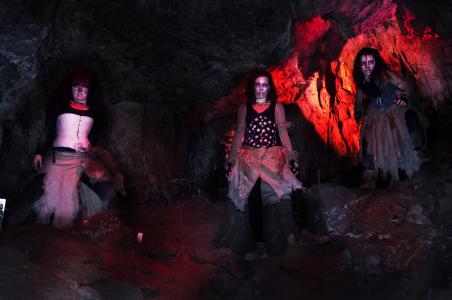
Butterfly is a familiar name to anyone who’s been to previous Fringe festivals. They’ve been performing Shakespeare in Poole’s Cavern for the last three years, but this year they’re back with something slightly different; a new piece of writing, by Ed Hartland, which tells a slightly different version of Bram Stoker’s classic ‘Dracula’. The script deviates slightly from the book – Mina has been forced to kill Lucy after Van Helsing and Dr Seward have gone to Dracula’s lair, inside the cave, to try and finally kill him off. While underground they meet His three brides, who want to present the men as a gift to their beloved. Unfortunately, we never actually meet the elusive Count. While the script seems to lead up to a final confrontation, he never appears, instead allowing his would-be murderers to escape the cave. The script also hints at a love affair between Mina and Van Helsing, which tastes slightly of a desperate attempt to force in a romantic sub-plot.
Aside from this the script was very good. The language is loyal to the original book, and the characters remain largely unchanged. Mina is a very strong character; there was a bit of mental air-punching when she told the boys off for leaving her behind simply because of her gender. Dracula’s three cockney brides are a fairly new creation, but are a wonderful blend of flirty and irritable. They manipulate the men, slowly pushing them on through the cave and dragging the audience behind. They’re quite similar, but still have their own personalities and roles – despite most of the play revolving around the men; the play does still pass the Bechdel test.
One issue that needs to be address is the vocals in the cave. Since there is quite a strong echo, some of the words need to be slowed down, pitch lowered, and the men need to be slightly quieter, or else some of the words end up echoing into each other and being hard to distinguish. Although, Poole’s Cavern is a very effective setting for the performance. Lit up in red and purple, full of mist, and candles over the rock formations, the actors move fluidly around the space, making use of the (thankfully) dry river bed, platforms and walls. The space creates a sense of the unknown, and anticipation. Nearly the full length of the cave is used, as the audience follows the performers along the path. Note; it is quite chilly, do bring a coat. One of the most effective moments of the piece is when Van Helsing suddenly appears from underneath the bridge, from below the audience’s feet.
The acting is impeccable, as any who has seen the company before would expect. The characters are three dimensional, and the room for interpretation is well used. It is a joy to see Renfield fully exploits the physicality of his character, next to Mina’s attempts to still be ‘proper’, as she climbs through a cave after stabbing her best friend in vampire form. Dr Seward’s character has been changed a little from the books, a bit more ‘angst-y teenager’, but this works next to Van Helsing’s mix of anger and pure focus.
As in previous years, they provide their own music, using drums and chanting, for which the cave acoustics work very well. This is a strong performance, in a beautiful setting, and with a few minor adjustments the group will hopefully achieve the same success they have had at earlier Fringes.
Ariane Dean
SERIOUSLY FUNNY - Dreamshed Theatre
No less than a World Premier for the Fringe! Newly written by the two Dreamshed Theatre cast members alongside Artistic Director, Bill Cronshaw, this imaginative piece explored the often difficult relationship between two unlikely friends and comedy-colleagues, Kenneth Williams and Tony Hancock.
Iain Barton played Hancock at his grumpiest best whilst Wink Taylor, who in his day job puts words into the mouths of Basil Brush, Theo the Mouse and Sooty (Sooty has words?) performed Williams with a loveable vulnerability.
The body imagery and vocal skills of both actors provided the truest tribute to the funny-sad comedy talented team of Ken and Tony. Copycat mimicry it was not, it was respectful acknowledgement by carefully observed and detailed impersonation.
Mood music evocative of the era where radio housed the brightest stars of comedy mixed with replayed sketches, off-air conversations, off-the-cuff comments and inevitable comic asides to the audience; these highlighted the developing relationship between the two characters throughout their public and private lives.
Why were they so popular and successful? Were they just an absurd team that just seemed to strike comedy gold or a man with a funny nasally voice and catchy catchphrases and another who plumbed the depths of alcoholic tragic-comedy? Or were they joint explorers of the comedy horizon?
A great comic requires not just a good gag, but versatility, timing, vision, believable crowd-pleasing characters and an appreciative audience. This show has all of these things wrapped up in some very clever and sensitive writing. Don’t miss the next and only other Fringe performance on 15 July, it really is seriously funny!
David Carlisle
THE SPEECH by Tony Earnshaw - Unfit Productions
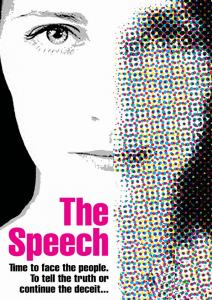
The Pauper’s Pit (further performances 15th & 16th July)
This is the second show that I have seen at this year’s Fringe that in some way or another deals with public scepticism towards the English political process. (The other was comedian Alistair Clark’s very different ‘Vote Russell Brand’.)
“The Speech” is set in the “not too distant future” (perhaps around 12 years away). England is necessarily a separate country – Wales and Scotland are independent and have formed a Celtic Alliance. England has engaged in some sort of ‘war’ with Europe but has rapidly surrendered. Climate disasters threaten the south-east – the Thames Barrier is likely to fail and many will drown. Who would be Prime Minister of so weakened and vulnerable a country? Well Liz Oldfield (played by Debbie Christie) would be.
She is in her second term as Prime Minister. Apart from the obvious political crisis that looms – what must she say to cabinet and the English public about the threatening catastrophe? – she is also suffering a personal crisis. She is a feminist; she became a politician and prime minister to make a difference. She has become sucked into the political machinery – of advisors and spin-doctors – at the expense of her personal integrity.
In the play she meets with her speechwriter, John Jones (Tom Cobley) to discuss the speech she must now make. John has drafted out something – that is his job, after all. He and the Prime Minister go through it line-by-line trying to get the tone and message right. Should she accept blame or responsibility? Is she making herself look weak or vulnerable? How personal should it be? Can she use the words of Kipling?
John’s initial draft (she calls him John, but he finds it hard to call her Liz even though they have worked together for years) is made up of a string and clichés and platitudes. Gradually, it becomes more like Liz’s own words – she is expressing herself, in her own voice. John encourages her in that direction – saying she should turn her back on the evil crafts of paid advisors.
The play closes with Liz walking into cabinet and we hear her first words. Has she been able to heed John’s advice or does she fall back on the glibness that characterises the worst of the professional communicator?
‘The Speech’ – directed by Darren Cheek – is a serious play about the potential collapse of the democratic process. To me it was a profoundly pessimistic account – though I’d welcome the views of others – suggesting it seems that no events may be terrible enough to change the habits of professional politicians.
Keith Savage
THE ANGINA MONOLOGUE - Doug Devaney
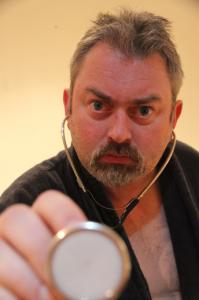
Doug Devaney takes you through a rollercoaster of emotions as he reflects on his life of fags and booze through to stents and cholesterol! Starting out with some memorable moments from the Carry On series, Doug shares his medical history, his thoughts on hospitals, the doctors and nurses and the medical profession. He likes facts and defies the audience with some fascinating statistics; he gives us laughs and some home truths and even a song and a ukulele.
Some amusing moments centred on the exercise class and the ‘get physical’ aspect of his rehab and how his angina launched his very short media career. The realities of having an angina attack rested with a sense of sadness about his relationship with his family and sons and the frustrations of a healthy lifestyle. This is where you really see the depth of this actor’s talents.
Doug is not a good patient; he is just like all of us -questioning, challenging, scared, intolerant and very human. This is a thought-provoking and entertaining tale which is guaranteed to put you off that second bacon butty – for a short while!
Sandra Cooper
THE WOMAN ON THE BRIDGE - Wireless Theatre
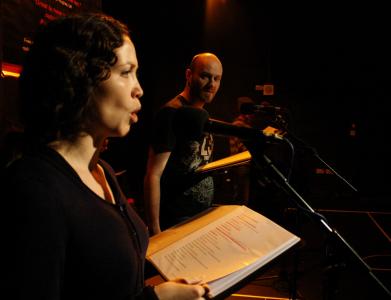
A sell-out! Not something often seen by me at the Fringe despite the talent on offer, but this joint Festival/Fringe show saw quite a few disappointed souls turned away. However, not all is lost for them as they may download this wonderful Wireless Theatre Company performance and enjoy it anytime in the comfort of their own home (for information go to www.wirelesstheatre.co.uk).
A unique situation awaited me in the Palace Hotel for the performance as I joined over 150 others in the hushed atmosphere as we were given the live recording treatment.
Standing before their audience, the actors performed with an occasional re-take: it only looked awkward by their semi-fixed positions at the recording microphones. Sound effects were created by the actors or played-in from the adjacent back-up crew. Rest assured though, this was acting of the finest quality, facial expressions, dramatic lighting and appropriate body language made it seem more likely that video recording was being undertaken.
All was quiet until something funny, exciting or utterly frightening happened when the audience burst into life to show their presence – this kind of audience participation thoroughly encouraged.
Local flavour was maintained within the newly written play which placed an evacuated girls’ school within the grand Chatsworth House. Involving a complex and gripping tale of ghostly goings-on, possession and a secret love affair, the play was set amidst a cold winter during the Second World War and cleverly explored what it means to be “truly alive.”
This was a one-off performance for Buxton, so to get to appreciate the skill and craft of this Theatre Company, you’ll need to pop along to one of the eight shows at the Edinburgh Fringe or download yourself a copy, close your eyes and immerse yourself in the drama.
David Carlisle
SOLDIERING ON by Alan Bennett - library theatre touring company

Alan Bennett wrote a series of monologues called Talking Heads where each one illustrates the personality of the character and how they approach the events, mostly small incidences, in their lives. Each monologue treads a fine line between comedy and tragedy, happiness and misery and invites you to a very personal account of the character’s observation of their situation.
Soldiering On is an uplifting play in spite of starting out in tragic circumstances. Muriel is a recently widowed wife of a stockbroker; very prim and proper, practical and confident. We are presented with a character who is organised and patient in her pearls and twinset, coping with organising the funeral, refusing to let the side down by ‘blubbing’ in front of the guests. You immediately warm to Muriel as she tells you about her daughter Margaret, who has a mental illness; her son Giles, taking over her affairs counselling her on liquidity; the local ladies arguing over her husbands clothes and everyone advising her ‘not to make big decisions’, when in reality you know that her life is falling apart.
There is a splendid glimpse of Giles’s insensitivity who would be ‘too upset’ to visit and you are left in wonder how Muriel remains so calm and even cheery at his attitude. The audience were offered amusing quips where you felt - this is it, she is going to break down, but still Muriel soldiers on.
In all Deborah Kelly’s portrayal of the stoic ability of Muriel to see the good in every situation even though others are taking advantage of her, is a credible performance which she delivered with real feeling and empathy. Even the noise from the adjoining room did not affect her flawless performance!
Sandra Cooper
THE ELEPHANT MAN - Hasland Theatre Company

Many of us will be familiar with the story of John Merrick from David Lynch’s film starring Derbyshire actor Sir John Hurt as ‘The Elephant Man’. This was, you might suppose, the definitive word on this tragic and appalling story and so, you might ask, what could the Chesterfield-based Hasland Theatre Company add to our understanding? [It is worth noting that this play by Bernard Pomerance actually predates Lynch’s film which is not based on the play].
In the Lynch film, of course, all manner of prosthetics and make-up brought to the screen the grotesqueness of Merrick’s appearance. Central to Hurt’s performance was the presentation of a man of intelligence, some wit, manners and curiosity. Merrick was – appearance aside – much the sort of man you might want as a friend and companion. The strength of the film was the ability to take us beyond our initial shock.
Amateur dramatic companies rarely have that sort out make-up department and so Steve Cowley who plays Merrick in this dramatisation has to rely on gesture and as much physical manipulation as he can manage. His performance is, of course, central to the play and he is persuasive, bringing a quiet dignity to the role. [Evidently professional productions opt for the same course – requiring the audience to work at imagining what Merrick looked like and why people reacted as they did].
This allows a slightly different emphasis to emerge from the story – rather than confronting the spectacle of ‘The Elephant Man’ we are encouraged to imagine how he might find comfort and solace after years of being an object of curiosity. The surgeon Frederick Treves (Rob Dean) seeks to provide him with physical and material comfort and introduce to a social network where Merrick might flourish. All who meet Merrick find something of themselves in Merrick – in this way we are to conclude that appearance cannot be all. An actress, Mrs Kendal (Nicky Beards) might have offered him sensual experience had she been allowed – her undressing for Merrick is disturbed by Treves. Merrick himself is seemingly of a Christian disposition and meets regularly with Bishop How (John Hopkinson). Though some men of science – notably Francis Carr-Gomm (Tom Bannister) a hospital administrator – are at a loss to understand how any God who made Merrick could also love him and warrant the man’s devotion.
In their different ways these people allow Merrick to live something like a ‘normal’ life but his deteriorating physical health makes his early death (aged 27) inevitable. Hasland Theatre Company is to be commended for this production – choosing, as they have, a play well outside the usual range for amateur companies.
Keith Savage
OUI CHEF! - Act-IV Theatre Company

Oui Chef! had a somewhat shaky start due to having to compete with the tail end of the carnival which was still audibly happening outside the Shrewsbury Room of the Old Hall Hotel. However, confidence was restored once the floats had dispersed and the six-strong cast got into their stride.
Although not being billed as a musical, Oui Chef! contains a lot of songs. A lot. Some are more successful than others. I particularly liked the rhyming of “spared” with “merde” in the scene-setting French Revolution number. However, a romantic duet in which the couple had to sing of “our souls” was less successful, for obvious and base reasons. Many songs were reprised, but the “What is Soyer up to now?” refrain really overstayed its welcome.
The life of French chef and culinary pioneer, Alexis Soyer was certainly a fascinating subject for a play and Andy Pritchard’s performance was suitably larger-than-life. His singing voice, however, proved to be very restrained (perhaps due to a cold) in a way that was at odds with the character.
The French revolution was an excellent starting point, not only in Soyer’s story, but also in the story of restaurant cooking in general. Chefs, who had previously only cooked for the aristocracy, turned their skills to preparing and selling their food to anyone who could afford it. Soyer, however, travelled to England in order to continue cooking for the aristocracy. There is a fascinating early scene in which the status of cooks is discussed; these highly skilled artisans are accorded the somewhat demeaning status of ‘trade’, despite furnishing the palates of the richest folk in the land.
I like this type of ‘comic-book’ theatre; fast paced, bold characterisation, quick scenes. Sadly, though, despite sterling efforts of the cast, they seemed hampered at times by the preponderance of songs which, far from advancing the action, didn’t appear to add anything much. An extra unnecessary ingredient, perhaps.
What make Soyer fascinating are the inherent contradictions in his character; he enjoyed hobnobbing with the aristocracy, yet had a genuinely philanthropic side as witnessed by his work with the poor of London and Ireland and soldiers overseas during the Crimean War. The Irish Potato Famine element of the play is the most problematic. What, in many respects, was a deliberate act of culinary genocide by the English is presented as nothing much more than fussy eating. The Florence Nightingale element, however, is a lot more successful. In the play’s most successful scene empathy is neatly and simply represented by the changing of hats.
All in all, something of a mixed bag. A fascinating story, enthusiastically told, but hampered by too many songs and not enough food. If, however, stories of great chefs whet your appetite, the play is being presented as a piece of dinner theatre in collaboration with the Old Hall on July 14th, where you get to taste some of the great man’s dishes. Bon appetite!
Malcolm Lomax
LES MISERABLES SCHOOLS' EDITION - Mad Hatters Music

On the 11th of July 2014, I saw Mad Hatters Music Youth Choirs rendition of the favourite French Opera, Les Miserablés. It was Naturalistic in style, taking Brechtian technique and mixing it with superb tenor, counter tenor, falsetto, soprano and mezzo-soprano vocals, to create an amazing performance that really moved the crowd. This is evident by the constant rounds of applause between Acts, scenes etc. I feel the vocals were the stronger part of the play and the parts were cast well. This especially goes for those cast as Fantine (Niamh MacNamara), Monsieur Thenardier and Madame Thenardier (Marcus Crabb and Erin MacNamara), otherwise know as the Landlord and the Landlady, Marius (Kel Bennett), Eponine (Maddy Gill) and also Corsette (Millie McDonald-Webb). I feel the best point of the vocals was definitely the solos in One Day More and especially the harmonies throughout.
They stuck to the stage version more than the film version and I give them credit for doing so. Most will have only seen the film so this would be out of their comfort zone and still managed to pull it off and also add in songs not from the film but only the stage version from the West End. The highlight for me was certainly the ending where it climaxed. The emotion conveyed from Ewan Kipatrick's performance as Jon Valjean, when he died was amazing and then the transition into the epilogue, singing Do You Hear The People Sing. It sent shivers down my spine, along with a few other moments thanks to the amazing vocals. That especially goes for Maddie Gill, who's performance of On My Own was almost as moving as that of the film and the stage show. Towards the start of the show it dropped off but the performers seemed to have collected themselves close to the interval and came back full force in he second half.
Overall, it was a great performance and would recommend it to anyone who's seen the film or the stage show or just enjoys emotion filled music. I don't really think the performance was tailored towards those who haven't seen it before due to a few story parts missing and the changes between scenes not being as clear as it would have been with multiple sets. But overall it was well performed and to a very high standard. A very well done to the Youth Chorus and the Junior Chorus for the amazing backing vocals that really brightened up the Harmonies and the larger scaled pieces such as Do You Hear The People Sing. It was wonderfully performed and I would certainly go back and watch the other three performances.
Charlotte Collins
GODFREY'S LAST STAND - Talking Stock Productions
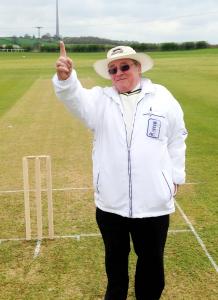
“Do I love cricket? What freeborn Yorkshire man doesn’t!”
This line spoken by Godfrey really sums up what this tale of following a dream is about. Made of the same stuff that inspired Peter Tinniswood’s ‘Tales from a long room’ and Roy Harper’s ‘When an old cricketer leaves the crease’ and of course ‘Last of the Summer Wine’, we see at play the notions of passion, pride, fair play and a sense of belonging to a tradition of something essentially English. Yes, English, but Yorkshire English.
A gentle tale, as befits this heritage, is at heart the story of Godfrey Shackleton, 50 years an umpire in local league cricket, grabbing a last chance to live his dream and some of the pitfalls along the way. Yes it is a little predictable in places, but that doesn’t stop it being a warm, nostalgic look at life through a lens.
The cast - Keith Royston as Godfrey Shackleton, Sharon Kelly as Godfrey’s long-suffering daughter Donna (named after a cricketer of course) and Alan Stockdill as Freddie are clearly at ease in their roles and are to be applauded for their work.
Unashamedly tear-jerking at times, humourous most of the time and with an unexpected ending which only a Yorkshireman might dream up, I say get along and see this before it goes.
Ian Parker Heath
BOY ON A BED - Organised Chaos Productions
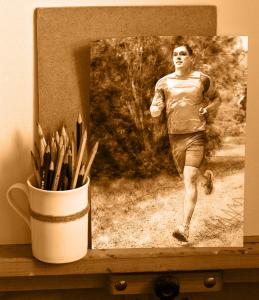
Boy On A Bed is a piece of new writing from Edwin Preece which tells the story behind a fictitious painting that gives its name to the play. It demonstrates the fragility of human sexuality intertwined with a world where there are still some taboos surrounding homosexuality and societies expectations. Fast paced, fluid, and dramatic, the script focuses on each character in turn before moving to the next, letting them give their own perspective on the events surrounding Adam; a runner, and Benedict; a painter. Sometimes funny, often touching, this subtle script will hopefully go on to receive the same success the company have had at previous Buxton Fringes.
The story itself draws the audience in. The characters are all very different to each other, and it is refreshing to see that they are all very deeply flawed. They each present a mask through their art, whether that be running, painting, or architecture. It’s understood that these are all forms of expression, and their emotions often come across more in the art than in their words. Perhaps it’s a reflection on the very British way of not saying what we really think – the one American character is more than ready to offer his thoughts, which is a beautiful contrast to the nervous pauses and brief stutters of the English characters. On that note – points to Michael Loftus. Hearing his real accent was quite a surprise after the performance.
Although, all of the actors deserve recognition. While there were some nervous first night jitters – occasionally some of the emotions came across a little forced – it was never the less a wonderful performance. They didn’t let the pace drop, and the attraction between personalities was clear. Kelly Diver, despite being new to the show, created a strong character in Stella showing the happy instability of a young woman just beginning to find her feet, mixed with the uncertainty of what may happen if something were to go awry. Adam Carroll-Armstrong cut a very recognisable figure in the boy starting to realise there’s more to life than just running, uni, and banter. Seeing their relationship develop on stage was interesting, and it was clear that after the introduction of Benedict, something was slightly off-beat.
A real gem was Matthew Hattersley’s Benedict. There was an obvious connection between actor and character, and his ability to subtly portray the cracks in Benedict’s outward persona helped to push his blossoming relationship with Adam to the forefront, where the script left room for the actors to interpret much of this themselves. At times the direction missed a beat during asides and monologues where there was a touch of wandering, but it really stepped up to the mark in important scenes, especially in some of the stronger scenes with Benedict and Adam as they faced off against each other.
This is a very interesting play with good potential – hopefully it will receive the recognition it deserves through this year’s Fringe.
Ariane Dean
FASHIONABLY LATE - Ginny Davis Productions
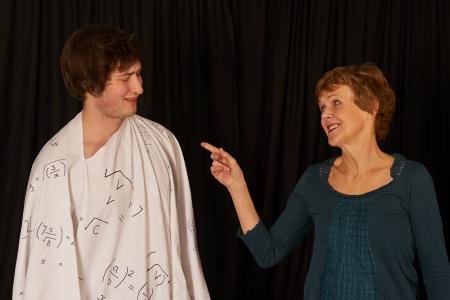
Fashionably Late is a comforting play, or as Ginny Davis would probably have it, as comforting as a cosy, comfortable, commodious corset. As a writer she is a little over-fond of alliteration, so that by the time we reach the denouement, we are so bombarded with ‘nervous Nazis’ and ‘cuddly Charlie Chaplins’ that it has a rather distancing effect on us as an audience. This is a shame because the potential to be very moving is certainly there.
I’m not going to give away the plot, but safe to say that once you have been handed a programme with the words ‘order or service’ written on the front, Dylan Thomas’ Fern Hill and a ‘eulogy’ inside, you can assume that there will be a death, and perhaps that death will be of a Welsh character. Cleverly, Ffion is an immensely likeable character – the most effective scenes are of her shopping for fancy dress in Claire’s Accessories and Ann Summers – so we mourn her passing too.
Ruth Rich, the central character of the play (also played by Davis) is a terminally nosey Mother preoccupied with the minutiae of middle-class problems. But in this comfy world no-one really appears to have any; the only thing ever raised in anger is an eyebrow. Ruth is forever scouring her childrens’ Facebook pages for clues into their lives, but truth be told, they don’t really have anything to hide. Her son, Fred (played with a winning physicality by James Goldsworthy, who also plays her two female offspring) is at first presented as an archetypal monosyllabic teenager, but soon shows himself to be sensitive, tolerant and understanding.
Laughter of recognition came from parents in the audience, but I suspect it was recognition of relationships as opposed to situations. Certainly a larger audience, though, would bring the comedy more to life. This is a world populated by underemployed young graduates, massively over-qualified for the work they are undertaking. Whilst this may have a satirical point to make, the fact that they don’t appear remotely bitter or angry about their lot means that the point is somewhat blunted.
Ultimately Fashionably Late reminded me of one of those short stories that are broadcast in the afternoon on Radio 4; full of detail and neat turns of phrase, but hardly the stuff of drama. The analogy is further highlighted by Davis’ use of a narrator; though her device of questioning who he is and why he is there, whilst initially interesting, seems a bit of a stylistic dead-end.
There is no doubt that Davis and Goldsworthy are talented performers and the dynamic between them works well. I worry though, that Ginny Davis in being both actor and writer (did she direct as well?) is spreading herself too thinly and thus selling her characters, her audience and ultimately herself short. This is a very sweet and touching story. I’m not sure it quite works as a play, but the narrative drive is assured and the characters well-drawn and engagingly presented. At school we were forever told that the worst thing you could say about something was to call it nice; this is palpably not true for this is a nice 70 minutes, and that’s not meant as an insult.
Malcolm Lomax
THE CHAIRS - JM Youth Productions
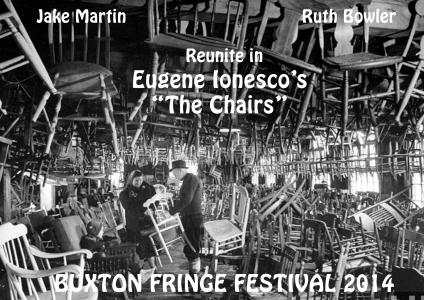
Those who choose to join Semiramis, her darling Poppet and a colourful chorus of chairs for JM Youth Productions’ adaptation of Ionesco’s absurd classic can expect to be fascinated and perplexed in equal measure. Audiences are invited into the humble abode of a vivacious elderly couple as they squabble, reminisce and, most importantly, prepare…the orator is coming to reveal The Old Man’s stunning message for humanity.
‘The Chairs’ is a difficult play to review as each audience member must, at least try to, make their own sense out of the ‘utter nonsense’ they are promised upon arrival. However, the small cast commit to the ludicrousness with a larger than life gusto that makes an ever-present feeling of bewilderment somehow enjoyable. Audiences are treated to rambling anecdotes, sudden temper-tantrums, song, dance, invisible partygoers and an ever-expanding collection of seats in an energetic and expressive performance that—thankfully—does not have to be understood to be delighted in.
The highlights of the tragic-farce are, I believe, best experienced without being too prepared. JM Youth Productions boldly and cleverly allow audiences to experience the awkward enchantment of the absurd for themselves through the introduction of an unexpected cast member in the play’s final moments and a wonderfully uncomfortable ‘curtain call’ in which a still stage comes glaringly to life.
‘The Chairs’ is perhaps not for those who find themselves frustrated by lack of clarity. It is an intentionally muddled jumble of the furniture— the laughs, dreams, and puzzles—which makes up a couples’ secluded life together and their attempts to find some sense in it. Amusingly interpreted and executed with exuberance, JM Youth Productions’ performance makes for an engaging, challenging, if necessarily bewildering, hour that will stay in your mind long after you (finally) decide to leave your seats.
Catch JM Youth Productions’ ‘The Chairs’: United Reformed Church - Purple Room: Church (55a). 12-13 Jul 5:30pm to 6:30pm, 7pm to 8pm £5 (Child £3, Conc £4).
Lilly Posnett
SPOONFACE STEINBERG - Freerange Theatre Company

Spoonface Steinberg is a poignant humorous play about a seven-year-old autistic girl’s battle with cancer. The play charts Spoonface’s birth to the present and touchingly explores her fascination with opera her relationship with her parents and her outlook on life. Lee Hall perhaps best known for his screenplays ‘Billy Elliot’ and ‘Warhorse’ wrote the play. Halls gives a fresh perspective in ‘Spoonface Steinberg’ on what it means to be alive.
Hall originally wrote the play for Radio in 1997 but it was later adapted for the stage by Freerange Theatre Company. Freerange have successfully transitioned the play from its original radio format on to the stage. The transition on to the stage I think has proven successful because Spoonface is not simply a voice she is a living and breathing human being that stands in front of us. The moments where Spoonface played beautifully by Rebecca Fenwick is intensely lost in the female opera singers voice are beautifully captured moments by director Hugo Chandor. These moments physically capture this little girls euphoria at the beauty and freeing quality of the music and the sense of being alive. These physical snapshots of Spoonface overwhelming joy of being lost in the music and for a short time forgetting her illness I believe can only be done justice to when they are performed on stage and Freerange’s production successfully does this.
Rebecca Fenwick in the title role truly delivers a beautiful, sensitive portrayal of a young girl dying from cancer. Fenwick directly engages the audience with Spoonface infectious warmth by her smiling demeanor and fits of giggles especially when she describes her eyebrows falling off after treatment. Fenwick engages us with Spoonface’s thoughts on how life always holds meaning through her subtle delivery. The subtlety of her delivery combined with a matter of fact tone allows Fenwick to create moments in the piece that undeniably are thought provoking and make the audience consider how they value life. These moments in the piece are able to draw on perhaps Hall’s main focus of this play that we have to the value the lives we have and lead in the present moment.
Fenwick effortlessly physically characterizes an autistic child’s stance and she physically engages the audience with Spoonface’s friendly manner by greeting audience members with a handshake. The combination of Fenwick’s matter of fact tone when she casually refers to her mother’s alcohol dependency and her fathers ‘Floozie’ are beautifully delivered and help to interject moments of light relief into a play that explores difficult topics.
Freerange Theatre Company has had great success with ‘Spoonface Steinberg’, which has been on tour since last year. The company’s production itself was nominated last year at both the Manchester Theatre Awards and the Buxton Fringe Awards. This companies production I believe is highly successful because it creates a moving, tender humorous portrayal of a young autistic girls musings on life, love and faith as she battles cancer. I urge you to see this performance by Freerange Theatre Company because in equal measure it will leave you in tears and fits of laughter!
Emmie Alderson
TREASURE ISLAND - Uproot Theatre Company

Sometimes there’s nothing better than a good story, well told. Obviously Treasure Island is a great story, a ripping yarn that has entertained centuries of readers, and in this brisk, one-man performance of Robert Louis Stevenson’s novel, actor Jamie Robertson certainly brings it to life.
Robertson has a talent for vocal and physical characterisation and Stevenson’s characters are vividly made flesh – the wide-eyed Jim Hawkins, the stiff upper-lip Dr Livesey, the grotesque Blind Pew – surprisingly the one slightly glossed over is Long John Silver, who becomes slightly lost in the mix while Squire Trelawney becomes a slightly more dominant (if funny) figure.
There’s an awful lot of plot to fit into an hour and, while the opening is fantastically atmospheric, the ebbs and flows of the plot once the island is reached become a little confusing. That said, the sheer energy of Robertson’s performance more than carries the weight of the narrative in this brisk and highly entertaining show.
Robbie Carnegie
ALL MY SONS by Arthur Miller - Spotlight Theatre
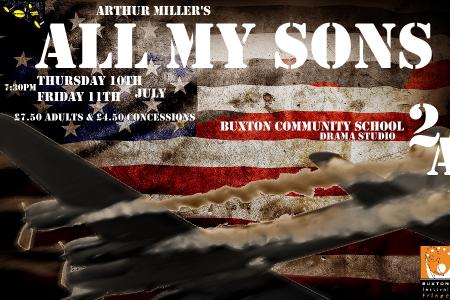
Arthur Miller’s All My Son’s written in 1947 is a tale of deception, immorality and heartbreak. Here we see a post war American family dealing with the loss of their eldest son Larry whilst trying to hide the past and coming to terms with the decisions they have made. The play see’s the family’s past dug up and them finally coming to terms with what they have done and taking responsibility for their actions.
The strongest points of The Spotlight Theatre Company’s adaptation of the play are in Acts 2 and 3 when we witness the family’s problems reach breaking point. Act’s 2 and 3 are very different to Act 1 when the pace becomes a lot quicker and much more dramatic. The actors really got into their roles and really made the characters believable and relatable. The two most stunning performances of the evening were David Cooper and Catrina Shaw who portrayed Joe and Kate Keller. Catrina’s performance of Kate was exactly as it should be. She made you feel everything she felt. Whenever she talked about Larry you could feel that aching pain of waiting for someone to return, who deep down you know will never return. Shaw’s performance is more loud and vibrant where as David Cooper’s performance is much more subtle. It is a contrast that works well. The subtlety is best noticed and appreciated in Act 3 when Joe finds out the truth behind Larry’s death. The performance given is very calm and collected as Joe finally gains insight into the consequences of his own greed and reckless decision- making. The final moments of the play are emotionally harrowing and heartbreaking. To the audience it is clear that this is a man who has lost everything and everything that he once believed and once thought to be true has gone.
This young company has pulled off a complex and emotionally charged play with great success.
Phoebe Alderson
PHILLIPA & WILL ARE NOW IN A RELATIONSHIP. THE WAKE - Freerange
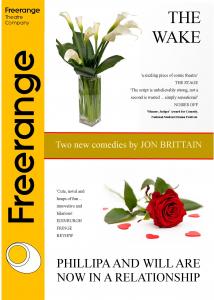
Freerange has built a great reputation at recent Buxton Fringes and does not disappoint in this lively double bill directed by Hugo Chandor.
Both plays are by contemporary playwright John Brittain but they could not be more different. In Phillipa & Will two university students play out their relationship on social media with the entire story told through messages on Facebook. Adam Urey and Rebecca Fenwick (unrecognisable from Spoonface Steinberg) managed to embrace their parts convincingly despite having to utter some of the silliest, ickiest love chatter ever. It is frightening to think that this was apparently based on six hours of real transcripts from a couple of Brittain’s friends. Their virtual relationship was certainly a lot of 21st century fun and with its verbalised emoticons and Facebook jargon, almost like learning another language. My only quibble was how all this was communicated to the audience. The projector screen seemed slightly underused, telling us little more than the dates and times of the communications. Meanwhile Adam and Rebecca sat on opposite sides of the stage actually reading the script – slightly distracting for me although I enjoyed their occasional physical interaction on stage and the idea of moving them next to each other to suggest their physical proximity when actually living together (yet still frantically Facebooking).
Adam and Rebecca were also the stars of The Wake and it was great to see them really come alive in a fantastically physical piece of theatre in which both took on a variety of roles with impressive ease. After a dramatic opening, which I won’t spoil, Adam introduces himself as Alec, a would be impressionist who finds it infinitely easier being other people than himself. We are, it transpires, to witness his account of a family scandal that has threatened his marriage. His Uncle Walt, cue Hunchback of Notre Dame impression and funny, strangled voice, has discovered that his glamorous new wife is pregnant following a family reunion in a Scottish castle. The question of who could be the father turns into something of a whodunit with Alec’s brother Bobby – a suave, proper thespian – and Alec himself in the frame. Rebecca meanwhile plays Alec’s wife who bursts onto the stage to correct some of his impressions and generally add her point of view. At times they even play each other. No wonder the lighting guy (we spotted you Hugo) can be heard to utter a wearily deadpan “Oh God!” after a particularly fierce squabble over whether the lights should be on or off. Farcical as it all is, there is an indication of real pain in these characters’ lives adding depth to a very rewarding piece of theatre.
Don’t miss out on the rest of the run which finishes on the 12th and look out too for a brief revival of last year’s hit Spoonface Steinberg, last performance Friday 11th at 2.30pm.
AN EXTRAORDINARY LIGHT - Breathe Out Theatre
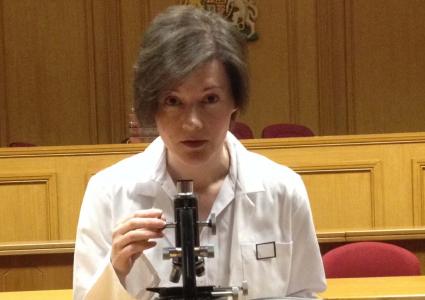
Katherine Godfrey provided an excellent performance as the unrecognised Rosalind Franklin, a serious and highly intelligent scientist who patiently checks, double checks and systematically analyses her data. Best known for her work on the X-ray diffraction images of DNA which led to the discovery of the double helix, the performance takes you through on a journey of the stages of Rosalind’s life as a serious child, when she first discovers science; an intelligent student, exploring and embracing the opportunities of study; a dedicated scientist, pursuing clarity and answers.
There is passion in Rosalind’s life which she alludes to in Paris but you soon realise it is more for another scientist’s mind; also for the ‘holes in coal’ which she expertly explained in understandable terms, not to patronise the audience but to demonstrate her joy in discovery.
Katherine portrays Rosalind’s anguish and anger of not being ‘part of the race’, when it was her patient, painstaking images of X-ray diffraction that confirmed the structure of DNA that was the major contribution to this scientific discovery. Throughout the play you could feel the pain of injustice at the image being shown without her knowledge; but you also glimpsed her arrogance that she felt superior to her peers, that only through her experiments and thorough analysis could the absolute answers be found. However she concedes that her pedantic addiction to the absolute restricted her vision of the final DNA model.
Yet you were left with an overwhelming sadness that it was the very experiments that she undertook that led to this extraordinary discovery that eventually killed her.
Science is Rosalind’s life, passion, love and ultimately her death.
A must see play expertly performed by Katherine Godfrey, written and directed by Rob Johnston which is both educational and thought provoking.
Sandra Cooper
HIS LETTERS - Dreamshed Theatre
His Letters is an excellent example of story telling that explores family relationships and how we interact with people once they are gone. It strengths were in “how” the story was told rather than “what” story was being told. How the story was told is down to a combination of both the actor and the writing.
To begin with I was drawn in to the solo performance with the captivating performance of John Martin Stevens he transformed between the different characters with ease. Each person was clearly distinguished from his character’s mother, father and the next-door neighbour. Not only that Stevens managed to portray both the humour and depth of sorrow within the writing, some of which I think would have been missed by a less accomplished actor.
The writing carefully balanced the performance between narrative story telling, character thoughts and present time action. Each thread helped the audience to visual the world within which Stevens’ character rediscovered his parents by giving the audience small snapshots of them falling in love during the war and also what moments of what happened in their “happily ever after”.
Between the acting and writing the only other aspect I want to highlight is the use of songs that help to the audience to place the story within the correct time period but also give the story time to breathe. This musical punctuation accented Stevens’s performance and gave me space to appreciate what I had just seen.
Despite finding “what” story, or rather what the outcome of the story, being told a little obvious, overall the His Letters is a reminiscent, warm, story delivered with love and dedication. I enjoyed watching the tale be told and would urge festival goers to head to the United Reform Church over the next couple of weeks and see this for yourself. It was a lovely way to start of my fringe season, however take a coat, as the room is a little chilly!
Toni Saxton
PHONE WHORE (A ONE-ACT PLAY WITH FREQUENT INTERRUPTIONS) - Cameryn Moore/Little Black Book Productions
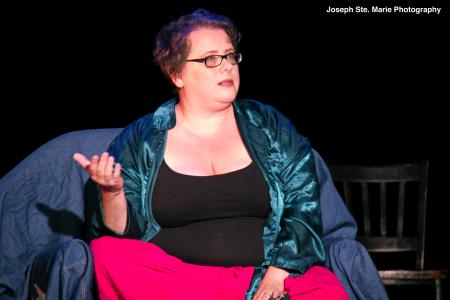
Imagine a sexy Jo Brand, picking up where Secret Diary of a Call Girl left off, and making it much more realistic. That’s the general premise of Phone Whore, a one act play with frequent interruptions as our narrator Larissa takes calls from her clients. As a warning; this is not for the faint hearted (but if you make it through to the end you can buy a rather nice badge). There are no secrets, nothing to hide, and extremely little held back. It’s a frank, honest, and funny production that chronicles an evening with Larissa while she’s working, takes moments out to talk about what she does and take a hold on her emotions.
Phone Whore is the brain child of Cameryn Moore, erotica author and, of course, phone whore. As the audience enters she moves around the space, getting to know who’s there, why they’ve come, how they found out about the production. Then the phone rings, and it’s down to business. Moore’s acting ability comes to life when she takes the calls. She becomes a different person for each client, shifting personality and scenario. As the play progresses, the calls become less and less vanilla, easing the audience in but still taking them by surprise. Much of the humour comes from the contrast between what she says and what she does (long dark hair and pink lace panties vs. short hair and the pyjama bottoms familiar to anyone who’s ever worked from home).
It’s not always funny; there’s a reason for the warning in the program that some of the situations that occur in the play aren’t approved of or tolerated, although they are taken from actual circumstances. At the core is a fun, sex positive show about a woman trying to do her job. Unfortunately, it’s a job that comes with obvious drawbacks in the form of human imagination. There’s an idea that Larissa voices that as long as those fantasies are only lived out through her on the phone, then surely she’s doing more good than harm.
One of the things that draws the audience in is how refreshingly real the production is. It’s not sexy; it’s thought provoking and sometimes brutal. She’s no Irene Adler or Bell Du Jour. The fact that Moore has drawn so much on her own experiences shows, and the character of Larissa become a real flesh and blood person instead of just another under-developed media fantasy.
As previously stated, this is not for those easily shocked. Go in with an open mind and you are in for a very good piece of fringe theatre that can challenge commonly held views about the sex industry, and let you see a different side of someone who changes her personality every seven minutes.
Ariane Dean